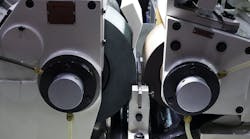Apathy is a lack of emotion, feeling, or indifference. In November 1995, the U.S. precision custom manufacturing industry was warned that Asian tool-and-die makers had formed a coalition with their governments, targeting new business in the U.S. market. The response from many American producers was “it won’t happen,” or “my customers are loyal.” The Asians had a 10-year plan to take over the market.
Flash forward to 2009. The U.S. industry has lost over 30 percent of its companies and the jobs they supported. More are in danger as the auto market has ground to a halt. Chrysler is bankrupt; GM is on the brink.
GM reports it buys almost 49 percent of its tooling packages from overseas suppliers. Almost 25 percent of domestic tool-and-die makers depend on automakers’ business. But, go to any U.S. retailer and you’re hard-pressed to find finished products made in the U.S. Has the Asian plan worked?
Many groups share the responsibility for this decline, but in my opinion the primary reason for this decline has been apathy. People just didn’t pay attention to the trend, nor did they care about its impact, until it had a personal effect on them.
Consumers want more and more “toys,” but they want to pay less and less. Responding to them, companies found ways to get those consumer products offshore. They have been rewarded with higher sales volumes.
Workers want higher wages with more benefits for less work, encouraging corporations to find low-cost countries in which to manufacture.
Corporation heads, under pressure to raise their companies’ stock prices, looked to lower their production costs without thinking about the long-term effects. They sacrificed their supply chain for short-term gains.
Everyone is to blame. Our system honors business leaders that ruin companies, and then pays them millions when they’re fired. Our laws protect companies behind a wall of bankruptcy that allow companies to buy products and services without paying for them. For some companies and their heads, this process has played out several times.
We elect officials and allow people to be appointed to high office who have broken the law, but we’re told “It isn’t important” — we accept it. Their personal ethics and public behavior don’t seem to matter. When the world economy stalls, we look to our elected representatives for leadership, but they use the crisis to spend at an historic rate. They’re concerned about re-election and personal enrichment. They support legislation that will weaken the economy, cost millions of dollars in new taxes, and lose millions of domestic jobs, all with no concern. They’re indifferent to other countries’ failure to succeed by these very tactics. Confronted by facts, they plead ignorance or issue personal attacks at their questioners. We allow this to keep happening.
Industry shares the blame. For example, machine shops have allowed training programs to die, but complain that they can’t find good skilled workers. Good training programs exist where the local industry, educators, and state or local officials work together. Good programs don’t exist in a vacuum and won’t succeed if the groups aren’t working together to promote their capabilities and to recruit new, capable people to the industry. An improving economy — and it will improve — will reach its potential only if it has enough skilled workers.
Apathy has given us a government of people looking out for their own interests. I hope our apathy will not make it possible for them to succeed.
The National Tooling and Machining Assn. and the Precision Metalforming Assn. established the “One Voice” advocacy group to inform and educate the industry about the importance of working together, even as they do the same in Washington. They need more support if this industry is to survive and become strong again. Right now, working together is more important than ever before.
Legislative changes are underway, and the industry must respond. Groups opposed to the interests of small manufacturers are spending millions to make their point. We may not match the dollars our opponents have, but as smaller manufacturers, we outnumber them. Our unified voice needs to be heard. Recently some Congressmen were surprised to learn that automotive suppliers beyond Tier 1 are not being paid — in spite of the taxpayers’ money supporting larger manufacturers. They were shocked by testimony that carbon cap-and-trade regulations will cost millions of jobs.
Will we let the apathy continue? Will more people in this industry decide they can no longer stand by and allow the few to carry the load? Can we agree that we’ve had enough, and realize that if we work together we can do more?
If you’ve had enough and want to be part of the solution, please visit NTMA at www.ntma.org, or contact us at [email protected] to find out how you can become part of the effort to unify the industry.







